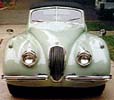



You are here: Home
   |

|
|
You are here: Home |
The pedantic proof-readerI’ve always had a companion who sits with me when I’m reading. While I’m concentrating on the content of what I’m reading - whether it’s a crime novel or a popular treatment of evolutionary biology - my little friend is carefully and critically proofreading the text. Why is he there? I guess it’s because I’ve loved writing almost as long as I’ve loved reading, so I read with a writer’s eye even when I seem totally engrossed in the meaning of the material. So I think he started life as the bit of me that wants to learn all I can from everything I read: spelling, puctuation, grammar - all the mechanics of written language - and also the stuff that makes for good style. He’s the bit I have to thank for my almost perfect spelling, and the bit that’s missing from people like my wife Patricia, who is also an avid reader but who simply doesn’t seem to retain spellings at all. So there he was, my little pal, doing all the hard work while I sat around enjoying myself. I have a lot to thank him for - not least the large slab of my career that has rested on my ability to write well. I owe him for the distinction I got in the Oxford and Cambridge General Paper when my marks in English Literature and French A-levels were rather average (less in the case of French: I only managed to get a second O-level in that!). The ability to walk into an examination hall, pick three subjects from a list and pour out essays that were both thoughtful and literate in a race against the clock came - at least in part - from everything I’d learnt while devouring books purely for pleasure. That in turn gave me my ambition to become a journalist, and the ability to adapt when I ended up in advertising instead, becoming a copywriter within a year. By the time I ’dropped out’ eight years later, by which time I was a press officer, I had become very good indeed at writing ad copy, and had also gone some way towards fulfilling my original ambition: two years as a press officer had given me opporunities to write press-releases (a specialised document in which you try to do the journalists’ work for them by getting great slabs of your material printed verbatim) and articles for both the house magazine and prestigious engineering journals. Much later, I wrote two series of articles on wine-buying for Living France magazine and finally got paid by the thousand-words (you can read these on this site). One of the nice things about those jobs was all the time when I had nothing to do but was trapped in my office with a typewriter and an endless supply of paper. So, when I wasn’t working I wrote for the sheer joy of it. I remember churning out great chunks of fiction in different genres, and I realised that my little freind had stored away whetever it was that constituted the styles of various writers. I wrote specimen chapters of spy novels in the style of Len Deighton and of science fiction in the style of Isaac Asimov. When I was banished to a wooden hut on the Trafford Park industrial estate in Manchester to satisfy the vanity of a regional publicity manager, I had most of my three-month sentence free to write a whole novel - the classic first novel by a young man exploring love, sex and much else, full of fantasy and wish-fulfilment. Much later, I decided that it was crap and threw it away - a great pity because I’d love to read it now! Then came the decision to move from London to Cornwall and train as a teacher. Two comments I remember vividly came from Bill Caudle, our English tutor, who wrote something like ’I don’t always agree with what you say in your essays, but I always enjoy reading them’ at the bottom of a wildly Marxist attack on television, and from Paul Fenhoulet, our psychology man, who told me that my extended essay was too advanced for the Certificate of Education course and that I should have been doing a degree. I believe that my ability to write well explains why I got a bare pass in Education Practice but a credit in Education Theory - well-written, entertaining essays which are typed rather than hand-written make tutors’ jobs a lot less tedious! Then, a lot later, I found myself editing Derbyshire LEA’s ’Computer Education’ newsletter, DICE News, and writing user-documentation for all the many packages of software we put together for schools. This was followed by the creation and management of educational content for CampusWorld, BT’s visionary but doomed early excursion onto the World Wide Web. Through all this, my little friend has been ever-present, spotting my typing errors and sending me back to revise sentences, paragraphs and whole slabs of text, aided by the most exciting IT tools I have every used: text-editors, word-processors and desktop-publishing systems. However, the wee guy has also been a prize pain in the neck - and seems to be becoming more of a liability the older - and more leisured - I get. Because now I can’t listen to the radio or read Sunday’s Observer without becoming incensed at the appalling things supposed professionals are doing to our glorious language! So let’s start with some real sillies... What is a ’thingiz’?’The thing is, is that...’ seems to be spreading like a plague, not just among politicians (of whom one expects little better) but among broadcast journalists. I first noticed it coming from Jeremy Clarkson (someone else of whom I have limited expectations in this area, though he gives me a lot of fun!): ’The thingiz is that...’ Where does something like that come from? You can understand someone hesitating: ’The thing is...[pause for thought]...is that...’. But for this to become established as a habitual grammatical structure even for one person seems unlikely. For it to spread like a bushfire through the broadcast media is incomprehensible. I don’t think it has found its way into print yet, because writing it would probably cause any professional to do a double-take, but you can hear it everywhere in radio and TV interviews. So there is a new word in the English language: ’thingiz’. Given that the Oxford Dictionary accepts new words on the basis of common usage, I wonder how long it will be before this abomination gets an entry - and how on earth the supposed guardians of our language will explain its etymology... To and betweenAnother weird one that seems to be spreading just as fast is exemplified by ’children aged between 11 to 16’. ’children aged from 11 to 16’ is fine, and so is ?children aged between 11 and 16, ’but you can’t be between something to something else. This is actually more worrying, because it’s not just a weird habit of speech - it’s a profound structural error, and these are becoming more and more common in both speech and supposedly professional writing (see below). ?from 11 to 16? means any age in that range including the extremes. Technically, ?between 11 and 16? means ?from 12 to 15?, the numbers between 11 and 16. If I say that I live between Nottingham and Doncaster, nobody would assume that I might actually live in either of these cities, would they? Or, in this benighted age, maybe they would... Where’s ’that’?I only read one newspaper: The Observer. To be honest, I simply haven’t time for any others - I keep up with news and comment mostly on the BBC. Unfortunately, the little friend I described at the top of this page insists on reading the paper with me, and spoiling my concentration every time he spots a bit of crap writing. Which is depressingly often. One linguistic nasty has been bugging me for ages in my Sunday paper: the use - or, rather, the non-use - of the word ’that’. I don’t know if the paper has got rid of sub-editors (remember, I said earlier that my love of writing was what drew me to journalism) or has programmed the grammar-checker on its desktop-pulishing system to elimiate most uses of this handy little word, but there are times when I have to read a sentence three times to be sure I understand it - when one little ’that’ would make everything clear. Let’s take an example. You might think ’I believe that Richard Dawkins is a disgrace to atheism’ sounds a bit pedantic, and that ’I believe Richard Dawkins is a disgrace to atheism’ is fine, and I have no problem with that. But ’Paul Marsden’s belief Richard Dawkins is a disgrace to atheism is nonsense’ is horrible.’Paul Marsden’s belief that Richard Dawkins is a disgrace to atheism is nonsense’ makes instant sense. Yet in any edition of The Observer you will find countless examples of this structure. And in some, it will render the sentence almost unreadable. Last week’s issue is already in my recycling bin, but I’ll try to add some real examples here before I discard next Sunday’s. Is there a rule here? I’m not certain, but it looks as if the ’that’ might be optional after a verb but not after a noun. Grammatical structuresThe correctness and incorrectness of grammar isn’t simply a matter of arbitrary rules - or even of established usage. Eccentric as English is - and my French friends would be happy to lecture you endlessly on that topic - there is a foundation of structural logic that enables us to express ideas clearly and unambiguously. Sticking with the last example, you can only be between two things, whether those things are geographical locations (between London and Manchester), ages (between 11 and 16), events (between the main course and the dessert), times (between January and March) - and so on. The word ’between’ means that you are not at either of the two, but somewhere intermediate - somewhere between (see - i can’t actually express this without using the word itself). If you want to be truly pedantic, you could say that children aged between 11 and 16 can only be either 12, 13, 14 or 15, but I wouldn’t object to stretching that point. But to be between London and Manchester quite clearly implies that you are not actually in either of those places. Children from 11 to 16 - more properly, I think aged from 11 to 16 - obviously includes the two extremes of the range, and logically should mean shildren aged between 10 and 17... But that’s just an argument about the meanings of the words. Where things get more serious is when the structural logic breaks down, because that’s when the meaning of a sentence can become unclear or even ambiguous. Our language contains many structures in which two or more chunks of meaning are linked in some way: ’either...or’, ’neither...nor’ and ’both...and’ are obvious examples. Digressing briefly, radio and TV journalists have been polluting the airwaves by using ’both’ to link more than two chunks. For God’s sake! ’Both’ means ’all two’, as in ’all three’. You really can’t get away with saying that a programme can be heard on both Radio 4 FM, Radio 4 long-wave and the Internet! And how about ’Both Gordon Brown but also Alistair Darling...’? Next, we’ll be hearing ’Not only David Cameron and George Osborne’ (as if one of the slimy Etonians weren’t enough!). For clarity, I believe that the grammatical structure between ’either’ and ’or’ should be the same as the structure after the ’or’. ’Both the red car and the blue car’ - not ’both the red and blue cars’, which might be more correctly ’both red and blue cars’, though that could get pretty wobbly in some contexts. It just occurred to me that older English usage would be very happy with ’the red car and the blue’... Then there are comma-separated lists. First, to get rid of a transatlantic irritant, let’s deal with the extra comma before the ’and’ which seems to be universal in US English but I believe also has an academic pedigree here, being known as The Oxford Comma because it was actually recommended by the Oxford University Press. There’s an interesting entry on it here, which says that using it and omitting it are equally correct. I find it deeply irritating in American fiction, and I believe it should only be used where the structure oif the list demands it, as in ’We ordered soup, bangers and mash, and cheese and biscuits’. Having said that, I would solve the problem with hyphens: ’We ordered soup, bangers-and-mash and cheese-and-biscuits’. My rule would be a logical one: if you take away all the elements in the list except the last two (the ones separated by ’and’) does it still make sense. I don’t much like ’bangers and mash, and cheese and biscuits’, but at least the meaning is clear. ’bangers-and-mash and cheese-and-biscuits’ makes much more sense. As mentioned on the home page, I have been reading books on genetics and evolution by Sean B Carroll. The man is an outstanding communicator, but his use of the comma makes me cringe - not just the Oxford one but the little mark in general - really mars this pedantic proof-reader’s experience of the books. Okay - the Oxford Comma is irritating but not a serious problem. The thing I really detest in comma-separated lists is a final item which is grammatically quite different from all the previous ones. ’I have a car, a bike and I sometimes ride a scooter’ is a simple example that would bring my reading to an instant standstill. This is the same error as using different structures on the two sides of an ’either’ or ’both’ sentence. Lay, lie, laid...Here’s another americanism. I read and enjoy a lot of American crime novels. For me, James Lee Burke is a truly great novelist and Michael Connelly is a truly great crime novelist. Patricia Cornwell was a great crime novelist who was creeping closer and closer to becoming a great novelist until she fell apart. And there are many others... I’ve already ranted about The Oxford Comma further up this page. I’ve noticed recently in many American books sentences like this:
Even more recently I’ve noticed the same structure creeping into the work of British writers - I’m pretty sure it turned up in one of Ian Rankin’s later Rebus novels. And it may or may not also have appeared in Sebastian Faulks’s disappointing attempt at a new James Bond novel, the cliché title of which escapes me a couple of weeks after reading it. Let’s lay this ghost... In The Oxford Compact English Dictionary (’compact’ being a relative term!), the verb ’lay’ has no less than 16 definitions, but before these is stated quite clearly ’(past and past part. laid). The verb ’lie’ also has a pretty rich vein of definitions, but before these it says ’(lying; past lay; past part. lain)’. Just as I have always believed! So ’lay’ is an action you can do to something. I can lay my jacket on the bed. In fact I have laid things on the bed, and on other surfaces, many times. But ’lie’ is an action you just do - it doesn’t have an object. I can lie on the bed. And as recently as last night I lay on the bed. In fact, I have lain on various beds many thousands of times in my longish life. (In older usage, I can also lay me down on the bed, but in that structure I am both the doer and the object. The past tense of that would be ’I laid me down’ - not ’I lay me down’ (which is of course the present tense), and the perfect tense ’I have laid me down’. Bored with, by or (ouch) of...Being bored with something is an immediate state: ’I started reading this really promising book, but now I’ve got really bored with it.’ Being bored by something is a longer-term state: ’I’m bored by science fiction/jazz/politics.’ Those two should have most situations covered, so where in the name of [insert anything you hold really dear] did ’bored of’ come from? I’d heard youngsters using it and assumed it was just a mistake that was spreading through street talk. Then I heard a BBC journalist using it. How does this happen? How do these useless new structures (I’m sure this one is used instead of ’bored with’) get into common usage and spread so quickly among professionals who really should know better? |
Personal site for Paul Marsden: frustrated writer; experimental cook and all-round foodie; amateur wine-importer; former copywriter and press-officer; former teacher, teacher-trainer, educational software developer and documenter; still a professional web-developer but mostly retired. This site was transferred in June 2005 to the Sites4Doctors Site Management System, and has been developed and maintained there ever since. 
|
|